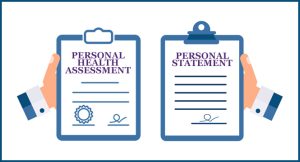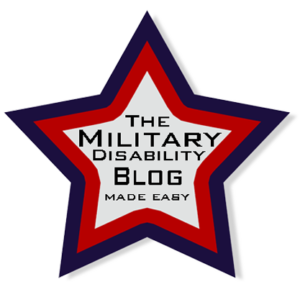Personal Health Assessment vs. Personal Statement
- Published:
- Last Updated: May 3, 2024

A Personal Health Assessment and a Personal Statement are both types of evidence that allow you to share your personal testimony regarding your case for DoD Disability and/or VA Disability.
Military Disability is determined based on the quality of evidence you submit with your case, and a personal testimony can often provide helpful support for your evidence.
The Quality of Evidence
To successfully obtain VA Disability and/or DoD Disability benefits, high-quality evidence must be submitted in support of your case.
For VA Disability, this evidence must establish service-connection and provide sufficient details for your conditions to be correctly rated.
For DoD Disability, this evidence must establish service-connection, prove that your service-connected conditions make you Unfit for Duty, and provide sufficient details for your conditions to be correctly rated.
In our Hierarchy of Evidence blogs (for service-connection and ratings), we discuss the different types of evidence you can submit with your claim and which are the most powerful.
At the top of these lists are official medical records and service records, and at the very bottom of the lists are personal testimonies.
Personal testimonies are the weakest type of evidence you can submit to support your case because they are only from your point of view and not from an unbiased authority or from an official source.
Personal testimonies are also optional. They are not required and are not submitted in the majority of disability cases, though there is now a stronger emphasis on completing a Personal Health Assessment prior to leaving the military.
So if they are weak and optional, why even submit a Personal Health Assessment or Personal Statement?
The Value of a Personal Health Assessment or Personal Statement
Even though personal testimonies are the weakest form of evidence, they can still be beneficial to your case.
Submitting a Personal Health Assessment or a Personal Statement in support of your claim can fill in missing evidence, provide firsthand experience, and draw attention to other essential evidence submitted with the claim. A Personal Health Assessment can also ensure that no condition is overlooked during the separation process (more on this below).
The focus of the personal testimony should be to clearly and simply state your case for service-connection, the ratings, and Unfit for Duty. If the evidence needed to support these things are already clearly in your official evidence, then a personal testimony is not needed. However, if the evidence is weak in any way, then a personal testimony can help strengthen your case.
For example, if you are trying to prove that your condition is the result of an incident that occurred during your military service but there is no official record of the incident, then your personal testimony would need to answer these questions:
- What is the direct cause of your condition?
- How is that cause connected to your military service?
- What are the details regarding the incident?
- What other evidence did you submit that verify that this incident occurred?
- What medical evidence do you have that connects your condition to this incident?
Personal testimonies are strongest when submitted along with other evidence that supports your case.
For the incident example, a deployment record showing that you were in the location where the incident occurred at the time it occurred will add credibility to your testimony. Similarly, Buddy Letters from others who were present at the incident can further validate your testimony.
The more evidence you submit that gives plausibility to your personal testimony, the stronger it will be.
Personal Health Assessment
A Personal Health Assessment (also known as a Separation Health Assessment, “SHA”) is an official form that a service member can complete in preparation for their discharge from the military.
Though it is technically optional, if you are going through the medical discharge process (IDES) or claiming VA Disability prior to discharge, you will be strongly encouraged to complete a Personal Health Assessment. This is an opportunity for you to ensure that all of your conditions are recorded and examined while you are still in the military.
You should submit your Personal Health Assessment prior to your discharge medical exam. The assessment will be used by your examining physician to ensure that they properly examine all medical concerns that you have. This will hopefully provide you with concrete evidence that can be used to support current and future disability claims.
On the Personal Health Assessment form, you are asked to answer questions about your health in 10 different categories, from a general medical review to mental health. It is vital that you include absolutely everything on this form, especially if you did not pursue medical treatment for a condition during your military service.
For each condition you list, you’ll be asked to explain. Give a short, but specific description of the condition, its symptoms/treatments, and how it relates to your military service.
At the end of the form is a section that allows you to provide more complete details. This is where you should focus on strengthening any weaknesses in your evidence. Here, you can give a summary of your overall health, provide details of the service-connection of your conditions, clarify rating evidence, etc. If possible, also draw attention to other evidence you are submitting with your claims that support your testimony (i.e. “See Foot Exam 3/24/22”).
We provide a sample of how to complete this form at the end of our SHA-Part A form.
A Personal Health Assessment can only be completed prior to separation from the military. If you are already a veteran, then you cannot submit a Personal Health Assessment to the VA but can instead submit a Personal Statement when you apply for VA Disability.
Personal Statement
A Personal Statement is a testimony that is most commonly used to support a VA Claim or Appeal, but can also be submitted during the IDES process for both the DoD and the VA.
VA Form 21-4138 can be used to submit your Personal Statement, but while this is preferred by the VA, it is not required. You can submit a Personal Statement on a plain sheet of paper as long as all of the required identifying information is included.
The Personal Statement must include:
- Name
- Social Security Number
- VA File Number (if any)
- Date of Birth
- Service Number
- Telephone Number
- Mailing Address
In the Personal Statement, clearly and concisely state your case, providing details that will enable verification of your claim.
This statement should not simply restate information that can be clearly found within other evidence you submit with your claim. Instead, it should reference that information (i.e. “See Foot Exam 3/24/22”) while focusing on proving service-connection, Unfit for Duty (for DoD Disability), and the ratings.
The Personal Statement can also clarify conflicting information that may be found in your evidence.
For example, if you have a knee condition that will be rated on range of motion, then it will be essential to ensure that the correct range of motion measurements are used. If one physician instructs you to bend your knee only to the point of pain and records that range of motion and another instructs you to bend as far as you possibly can, the measurements can differ greatly. You can use your personal statement to explain this conflict by making it clear that one measured only to the point of pain, while the other measured beyond it. Overall, the focus of the Personal Statement should be to strengthen any weak points in your evidence.
Personal Health Assessment vs. Personal Statement
Ultimately, both a Personal Health Assessment and a Personal Statement allow you to provide your perspective and testimony regarding your military disability.
A Personal Health Assessment is submitted early on in the process and is used by your examining physician to properly record all of your conditions, while a Personal Statement can be submitted any time and is not used for examinations.
The focus of both should be to strengthen areas in which your case is weak, like missing or conflicting evidence, and the statements should be focused on facts and direct experiences, not personal opinion.
While neither is required for DoD or VA Disability, a clear, clean personal testimony that enhances your evidence can fill out and add quality to your case.
Recent Posts
TDRL vs. PDRL—Which is better for disability benefits?
Leukemias and Multiple Myelomas NOW on the Presumptive List
Two MORE Conditions added to the Burn Pit Presumptive List
The 2025 VA Disability Rates are here!
About Us









